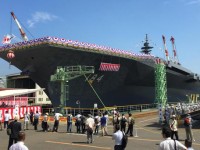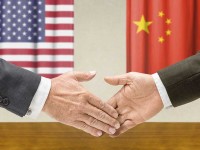Wu Sike, Member on Foreign Affairs Committee, CPPCC
May 12, 2016
The US strategy ignores the legitimate desire of most countries for peace and development and upsets the natural balance in the region. If Washington insists on playing the role of “regional balancer” under a misguided Cold War mentality, it would achieve nothing but create imbalance and walk right into the “hegemon’s trap” despite repeated historical lessons.
Wu Zurong, Research Fellow, China Foundation for Int'l Studies
May 06, 2016
The obstinate pursuit of US military hegemony in Asia will inevitably harm interests of both the US and Asian countries. The fundamentally flawed strategy could neither enhance the confidence of US allies, nor give any chance of US victory in any accidental conflicts or unfortunate wars in Asia. In any cost-benefit analysis, the effort is a waste of taxpayers’ money with no possible prospect of playing a constructive role in the region.
Zhao Weibin, Researcher, PLA Academy of Military Science
Apr 21, 2016
While the US struggles to adjust to its changing role in the international order, China should not give up its principles in handling relations, but be more active, practical and effective in expanding cooperation, and continue to facilitate the building of a new type of major-country relationship between the two countries.
Yin Chengde, Research Fellow, China Foundation for International Studies
Apr 06, 2016
Washington has forced its way into the issue to complicate it further and escalate of regional tension. Such an egocentric move is against the trend of the times and the fundamental interests of the countries in the region and is bound to end in failure.
Yin Chengde, Research Fellow, China Foundation for International Studies
Mar 07, 2016
For many years, United States military airplanes and ships have conducted close-in surveillance operations on China. Recently, with a more ostentatious move, a U.S. Navy vessel sailed within 12 nautical miles of the Zhongjian Island in China’s Xisha Archipelago in violation of Chinese sovereignty. The U.S. claimed that they will continue the practice in the future.

Curtis S. Chin, Former U.S. Ambassador to Asian Development Bank
Feb 07, 2016
As large parts of Asia celebrate the arrival of the Lunar New Year on February 8th, it’s in with the Year of the Monkey. But before the Year of the Sheep fully recedes into memory, we take our annual look back at the people and events that made headlines across Asia—for good and for bad.

Brahma Chellaney, Professor, Center for Policy Research
Jan 18, 2016
With Japan’s pride and nationalist impulse to play a bigger international role now rising, its domestic debate on national-security and constitutional reform is set to intensify. Although rising powers tend to be revisionist powers, a politically resurgent Japan, strikingly, is seeking to uphold the present Asian political and maritime order.

Chen Yonglong, Director of Center of American Studies, China Foundation for International Studies
Jan 12, 2016
From the Iran nuclear deal to the climate agreement in Paris, a new level of cooperation between Beijing and Washington signals that the pragmatic relationship dating from the Nixon administration is not threatened by changes in international conditions. A consensus is taking shape among celebrities, ordinary citizens, leaders and strategists in both countries that China and the US should not change their course of engagement and cooperation.
Wang Yusheng, Executive Director, China Foundation for Int'l Studies
Nov 19, 2015
A free-trade agreement for the Asia-Pacific would capitalize on the capabilities and the diversity of APEC countries. As broached by China in 1996, an open economy in the Asia-Pacific is a step toward common development, prosperity and progress for the whole region.
Lucio Blanco Pitlo III, President of Philippine Association for Chinese Studies, and Research Fellow at Asia-Pacific Pathways to Progress Foundation
Nov 16, 2015
The Philippine’s theme of this year's APEC Summit is “Building Inclusive Economies, Building A Better World.” Like the case for China's 2014 hosting, this 2015 agenda reflects clear Philippine domestic imperatives. As a major labor exporter, the Philippines will work well with the topic of investments in human capital development.
Back to Top

- China-US Focus builds trust and understanding between the U.S. and China through open dialogue among thought leaders.
- Our Offerings
- Topics
- Videos
- Podcasts
- Columnists
- Research Reports
- Focus Digest
- Stay Connected
-
Thanks for signing up!
- Get the latest stories from China-US Focus weekly.